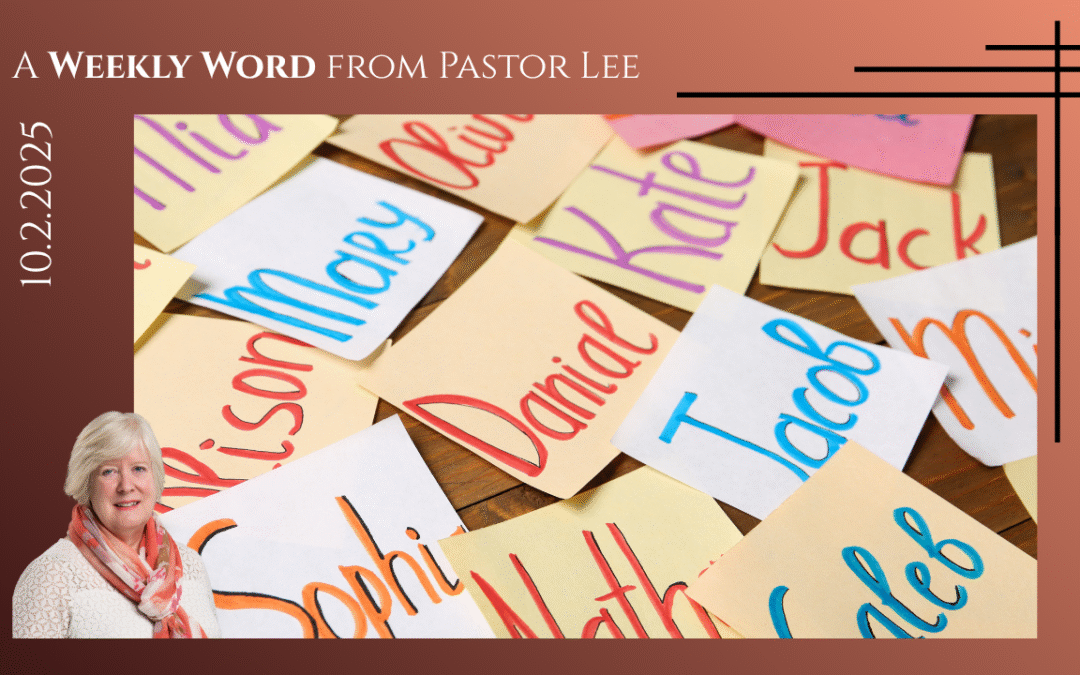Until the day my parents dropped me off at my college dorm for the first time, I was Lee Ann. I hadn’t consciously been thinking about the possibility of becoming “Lee” when I arrived at college. But when I wandered down the hallway to meet some of my neighbors that afternoon and it came to introducing ourselves, I said I was “Lee.” And I have never once regretted it.
It was part of becoming who I am.
I saw my naming story in a reflection by Cole Arthur Riley in Black Liturgies, on the subject of “Selfhood.” She admits her first name is actually Nicole, a name that was supplanted during her childhood by Nikki—which she found too perky and happy to fit comfortably. It was during her own college years that she claimed the name Cole (her actual name without the “Ni”), which her brother had blurted out on the playground years earlier.
“And what I didn’t say then, but realized years later and miles away from him, was that I was home in that moment, flying on that rusting swing set with him, letting our bodies flail and push and do what they had to without anyone else’s gaze stuck to us. His was an honest mistake, but not every truth is found on purpose.”
I was named after my grandmothers, Irma Lee and Anna Mae, as my mom told me again and again, rocking me in the big chair in front of the heat register in the dining room of the farmhouse where I grew up. “You could have been Anna Lee,” she’d say, which sounded beautiful to me. I heard it as one word, “Annalee,” long before I could have imagined spelling it. Annalee sounded more lyrical, more delicate than the prosaic and plodding “Lee Ann.”
I’ve always thought that, if my name had been Annalee, I would have turned out different. “Who I am” would have been different.
Cole Arthur Riley describes all her names converging on her wedding day: The priest calling her Cole. Her father calling her “Nicole, Babygirl.” Her uncle calling her Nick. Nikki making an appearance. She could see all this coming even before the day arrived. “I was worried about having so many sounds of me clanging around at once. Which is to say, I was afraid of myself.”
But somehow, that experience of all those names converging turned into a kind of peace, that could “bind me to who I am when everything goes quiet at night.” She goes on:
“I’m convinced that most of the time you spend “finding yourself” is really just the practice of admitting who you already know yourself to be in the deepest part of you.”
Last Sunday I shared during our prayer time this Howard Thurman quote, from a Spelman College commencement address, that Riley includes in this reflection about her own name, her own selfhood:
“There is something in every one of you that waits, listens for the sound of the genuine in yourself—and if you cannot hear it, you will never find whatever it is for which you are searching and if you hear it and then do not follow it, it was better that you had never been born…. And if you cannot hear the sound of the genuine in you, you will all of your life spend your days on the ends of strings that somebody else pulls.”
As our season of Becoming Who We Are draws to an end this Sunday, I hope you’ve been finding some time to encounter these questions. We’ve recalled the Holy Spirit’s lively engagement with our lives—bestowing gifts and passions, calling us to serve in ways large and small, arranging us into communities of faithful people who become together more than any of us could have been or done on our own. How are you noticing things you didn’t know before? How are you opening yourself up to what has always been true, but you weren’t ready to know?
Cole Arthur Riley closes this reflection with these words:
“To be people with any concern for the dignity and liberation of everything, we must become unequivocally familiar with our own faces. We must confront those things we’ve learned to use to obscure our own image. And in divine integrity, we must stay near to ourselves.
“I need you whole. Tell me what your name is. I’ll cradle every syllable as we swing through rust for the clouds.”
____________
“Selfhood,” in Cole Arthur Riley, Black Liturgies: Prayers, Poems, and Meditations for Staying Human (New York: Convergent, 2024), pp. 14-16


